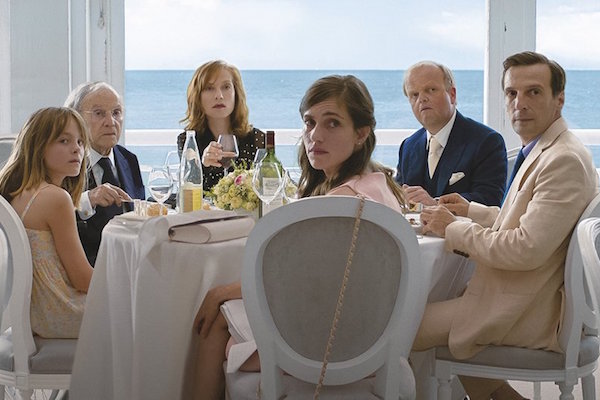
'Happy End' exposes dark undercurrents of bourgeois French life
By Diane Carson
The cerebral Austrian director Michael Haneke refuses to explain his grim, astute snapshots of scrutinized lives: the elderly couple in his Oscar-winning "Amour," the dystopian pre-WWI German village in "The White Ribbon," or the French couple receiving frightening anonymous tapes in "Caché." It comes, then, as no surprise that the ironically titled "Happy End" captures a troubled, bourgeois French family.
They, the Laurents, run a construction company in Calais where they live in a luxurious home with devoted servants. The 85-year-old patriarch Georges, showing signs of dementia, would like to end his life, to the horror of daughter Anne, who now runs the business. She's challenged by her rebellious twenty-something son Pierre. On hand also are Anne's brother Thomas, a head surgeon, and his second wife Anais with their baby. Ève soon joins them, almost thirteen when her mother dies, perhaps from poisoning.
The Laurents' interactions drive an episodic film with dark undercurrents: a fatal accident that will involve legal action, several attempted suicides, an ugly extramarital affair, African refugees, servants treated like children, and more. As events accumulate and tension builds, the impact is powerful, so much so that these self-absorbed, myopic individuals quite literally gave me chills. This is, in no small part, effected by superb acting, courtesy of Isabelle Huppert, Jean-Louis Trintignant, Mathieu Kassovitz, Toby Jones, and Fantine Harduin as Ève.
Characteristically, writer/director Haneke avoids melodrama or sensationalism, often keeping dramatic moments off-screen or presenting them with the camera at a distance. In fact, the film opens with Ève's surreptitious, character-revealing videotaping: she spies on and mocks her mother. This invites our own voyeuristic awareness, though later Georges notes that watching birds of prey pounce in televised programs is completely different from a real-life experience when your hands shake from the trauma. Haneke thereby challenges and warns us that actually encountering people like the Laurents is not the same as watching "Happy End." In press notes, he writes, "All around us, the world, and we, in its midst, blind," putting us on notice. I find myself observing the world with increased attention and circumspection.
With some English, primarily in French with English subtitles, "Happy End" screens at Landmark's Plaza Frontenac Theatre. Check listings.


